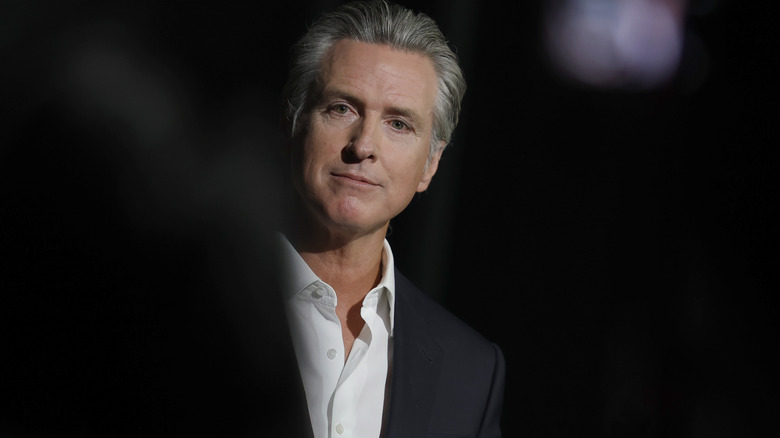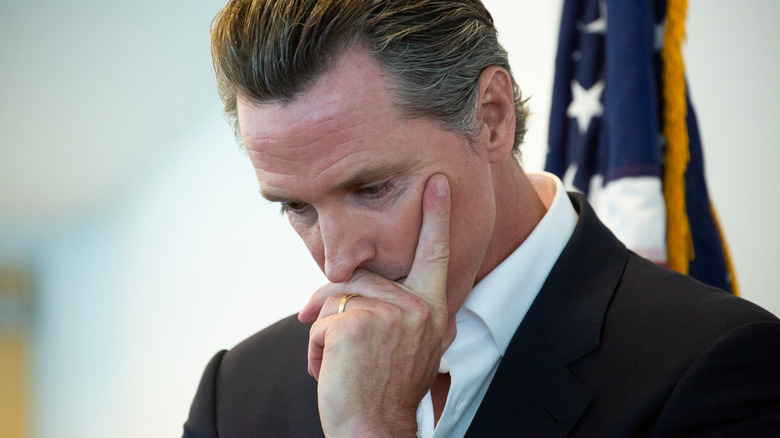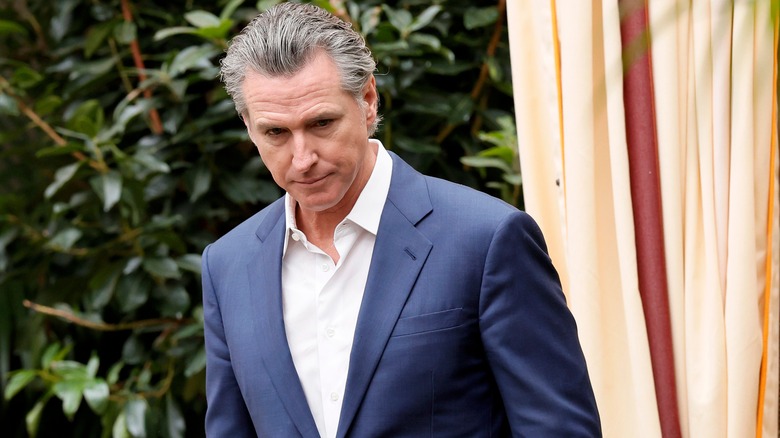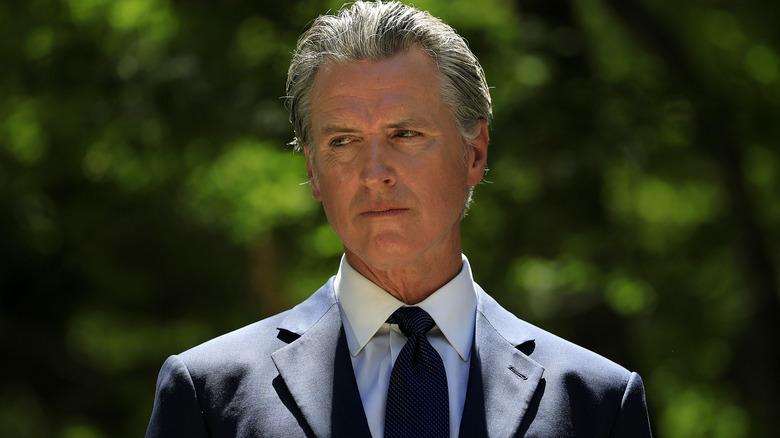Tragic Details About Gavin Newsom's Childhood
California Governor Gavin Newsom consistently made himself the center of attention in 2025, something his childhood self would have found utterly terrifying. Speculation is rife that Newsom will make a bid for the White House come 2028, and the governor sure is making his mark in the meantime. His social media strategy consists of trolling President Donald Trump by using the same unique diction and all-CAPS styling that permeates the divisive leader's controversial posts. Newsom has doled out tons of nicknames that gave Trump a run for his money and the California governor also brutally humbled JD Vance with some scathing tweets. Then, in October 2025, Newsom finally admitted that he might consider running for president during an interview with "CBS News Sunday Morning."
"Yeah, I'd be lying otherwise," the Democratic politician acknowledged when asked directly about whether he was setting his sights on the country's highest office following the 2026 midterms. Newsom is different from Trump in many ways, despite having resorted to using social media to troll the president and his administration. The popular governor had a very different upbringing and weathered a difficult childhood. Newsom was, in fact, one of those kids that the adults believed wouldn't amount to much. They were, of course, very wrong about him. From learning difficulties and bullying to weathering a life-changing event when he was just two years old, the future leader's childhood was permeated with tragedy.
Gavin Newsom was diagnosed with dyslexia when he was five
When Gavin Newsom was a kid, he never dreamed that he would live the life or have the successful career he does now. Gavin struggled in school; things that came easily to his peers, like writing, reading, and math felt impossible to him. Gavin watched his younger sister do what he could not so effortlessly, pondering what was wrong with him. "That was more difficult than you can imagine," he sadly admitted to The Yale Center for Dyslexia & Creativity." "I was always wondering why she would get done with her homework quickly and I was still struggling to work through it."
The youngster was diagnosed with dyslexia when he was five years old, but Gavin's mother kept it from him, not wanting her son to use it as an excuse for poor academic performance. He accidentally found out about his diagnosis in fifth grade when the future politician took a peek at some of the papers on her desk. Suddenly, everything made sense. Speaking to Understood, Gavin recalled how he and a few other students with similar diagnoses were set apart from the rest of their peers: "I was the guy in the back parking lot, in the temporary shed, with the other students [...] There was no unified education."
The former San Francisco mayor added, "I was just the slower student." His sister, Hilary Newsom, told the Los Angeles Times how much her brother's dyslexia frustrated him, and how their mother would try to help, with Gavin's tutoring sessions often ending in tears. "It was just really emotional for both of them," she said. The politician's dyslexia remains a challenge to this day, and he works extra hard to ensure he can deliver speeches and read from teleprompters without incident.
Gavin Newsom was relentlessly bullied at school
These days, Gavin Newsom is aging like fine wine, but when he was a kid, the future leader wasn't exactly considered a fine looking chap. Aside from Newsom's dyslexia, he also had speech issues. "I used to have a lisp. I couldn't speak," he informed Understood. "I had to go to speech therapy." Newsom's peers mocked him relentlessly and he became a shy and reserved child as a result.
It's something the Democratic politician still has to contend with to this day, but he had to overcome it in some capacity because of his career. Still, the California governor bears the scars from his childhood, confessing that he used to be a nervous wreck whenever he was asked to read aloud in class since, he noted, "Everyone laughed, because I literally couldn't read." Unfortunately, his inability to read and speak properly weren't the only challenges Newsom had to contend with.
He also had braces, a bowl haircut, and thanks to an annoying growth spurt, had to don leg braces to school as well. It was an irresistible combination for the cruel bullies. Newsom's sister confirmed to the Los Angeles Times that her brother was frequently tormented by the other kids, which sadly only made him more reserved and withdrawn.
Gavin Newsom's parents' divorce left him feeling guilty
Aside from dealing with a learning disability, speech difficulties, and severe bullying, Gavin Newsom also had to navigate his parents' divorce when he was just two. His father, William Newsom, came and went, never a constant in his son's life. "He was never terrible, but... he didn't raise us," the governor explained to "All the Smoke" in October 2025. Every now and then, William would make an appearance and whisk Gavin away on some exotic holiday. But his mother, Tessa Menzies, didn't exactly appreciate the sentiment. During a 2018 chat with the New Yorker, Gavin acknowledged dealing with a lot of guilt when it came to navigating life between his divorced parents.
Whenever he returned from a holiday, Gavin's mother would make her distaste crystal clear, sarcastically telling him, "Hope you had fun!" before distancing herself from her son completely. As the Democratic politician confessed, "The guilt. She made me feel horrible." His father's riches didn't last forever, though, and soon these grand vacations stopped. "[I remember] my mother yelling and screaming at my dad because he wasn't able to help us financially, because he was very close to bankruptcy," the governor recalled.
During his appearance on "All the Smoke" Gavin shared how his mother worked three jobs just to look after him and his sister. "[She] came from no money and just hustled, you know, worked hard grinding every single day," he pointed out. "So I was out there kind of raising myself." Gavin's father became more of a constant in his life when he was in high school, attending his baseball games. The teenager's aptitude for the sport helped him get into college on a scholarship, where he developed an interest in politics. The rest is history.



